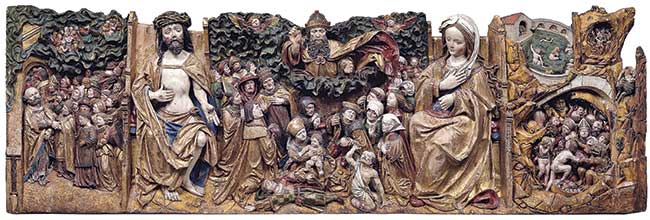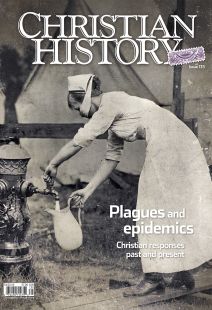“Christ is the master”

[Workshop of Master of the Biberach Holy Kinship (c. 1520), The Last Judgement—Wikimedia]
The Protestant Reformation’s destruction of monastic institutions largely closed off the major alternative to marriage for sixteenth-century women (though a few convents limped along for the aristocracy to park surplus daughters). Reformers put forth married housewives, not celibate ascetics, as the model of female godliness. Margaret Blaurer’s life, though, demonstrates how reform reluctantly made room for female celibate ministry. In her case this ministry culminated in her service during a time of plague.
Blaurer (c. 1493–1541) came from a wealthy family of linen merchants, prominent in the southern German city of Constance and the neighboring Swiss canton of St. Gall since the thirteenth century. Her brothers, Ambrose (1492–1564) and Thomas (1499–1567), sustained the family’s high profile; Ambrose joined a Benedictine monastery, and Thomas became mayor of Constance.
While studying law at the University of Wittenberg, Thomas fell under Luther’s influence and embraced evangelical ideas. He won over Ambrose, who left the monastery to become the leading Protestant pastor in Constance. Margaret, like her brothers, had received a Christian humanist education and knew Erasmus personally. The Blaurers also became friends with Martin Bucer in Strasbourg.
The reality of sixteenth-century marriage was that bereavement (often by plague) was common, the life of clerical spouses hard, and relatively few respectable women were willing to marry former priests or monks. Bucer kept trying to find spouses for his friends and colleagues, including Ambrose Blaurer. He also sought to marry off Margaret herself, first suggesting Wolfgang Capito (c. 1478–1541), whom he wished to keep out of the clutches of an Anabaptist widow. Later he tried to arrange a marriage between Blaurer and a theologically unstable Italian evangelical refugee 10 years younger. Bucer even suggested that should his wife, Elizabeth, die, he could marry Blaurer.
The matchmaker
That Bucer twice sought to marry Blaurer to people he considered in danger of heresy speaks to his high opinion of her own theological soundness. But Blaurer resisted. At one point Bucer called her “masterless,” but immediately added: “But you say, that where Christ is the master, a person is not masterless.”
After her mother died, Blaurer managed her family’s household as did Protestant housewives like Katie Luther. But her singleness and her brothers’ backing allowed her to devote herself to Constance’s poor and to establish an organization of women to assist her. She acquired the unofficial label “deaconess of the church,” a biblical term Protestants applied to women engaged in active ministry.
Blaurer’s ministry culminated with the plague outbreak of 1541. Transforming a former convent into a hospital for plague victims, she cared for them personally, even visiting from house to house to attend to the stricken and taking a young girl into her own house. Her brother Ambrose wrote to Heinrich Bullinger, “Pray, I beseech you, to the Lord, that he does not permit her who is our only comfort to be torn away from us.” But Blaurer sickened and died, aged only 47.
In the sixteenth century, the plague was the acid test of ministry. Clergy who abandoned cities were discredited; those who stayed and ministered were regarded as heroes. In giving her life to plague victims, Blaurer gave ultimate proof that Christ was indeed the only master she needed to carry out a true and godly vocation as a single woman. CH
By Edwin Woodruff Tait
[Christian History originally published this article in Christian History Issue #135 in 2020]
Edwin Woodruff Tait, contributing editor of Christian History. A longer version of this article appeared in CH #131 (2019).Next articles
“Now, Christ, prevail”
When plague struck Zurich, Zwingli hurried home from vacation to tend the sick but soon contracted the disease himself.
ZwingliChrist’s passion and ours
Heerman turned to Christ’s passion to make sense of suffering.
Jennifer Woodruff Tait



